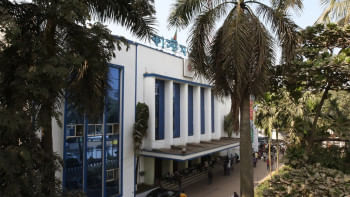Indira writes to Nixon

May 13-17, 1971
TAJUDDIN'S 18-POINT DIRECTIVE
Tajuddin Ahmad, the prime minister of Bangladesh, issued an 18-point directive on May 14 outlining the tasks of the people in the Liberation Struggle. He urged that the people should not listen to rumours nor should they have doubts about the ultimate victory.
"Let the people remember that in war marching forward and retreating are of equal importance. The retreat of the liberation army from one point should not give the people the impression that we have abandoned our war against the Pakistan occupation forces," he added.
The prime minister said employees of government and semi-government organisations who had taken shelter elsewhere would be considered as holding their posts and were expected to help the Bangladesh government and the Mukti Fauj according to their capacity. Officers and men of the military and para-military organisations, whether in service or retired, should immediately report for duty at the nearest liberation army unit and should in no circumstances allow themselves to be exploited by the enemy nor should they cooperate with the enemy, said the directive.
It further said employees in the communication and transport system should not cooperate with the enemy. At the first opportunity they should vacate the enemy-held areas along with their means of transport.
INDIRA GANDHI'S LETTER TO NIXON
Indian Prime Minister Indira Gandhi in a letter to US President Richard Nixon on May 13, 1971 shared her government's concern over the influx of refugees from East Pakistan.
"The influx of refugees constituted a grave security risk which no responsible government could allow to develop," she asserted.
The Indian prime minister informed that until the May 12, 1971, the number of refugees who were registered upon crossing the border into India was 2,328,507.
"We believe that there is a fair number who have avoided registration. Refugees still continue to pour in at the rate of about fifty thousand a day," added Indira Gandhi.
"We are doing our utmost to look after them, but there is a limit to our capacity and resources. Even the attempt to provide minimum facilities of shelter, food and medical care is imposing an enormous burden on us. The rains have begun in the Eastern region and soon the fury of the monsoon will be unleashed and vastly complicate the problem of providing shelter to the evacuees."
She alleged that the rulers of Pakistan would wish the refugee problem in India to result in an aggravation of social tension and religious strife. The Pakistan government probably had a vested interest in this, added the Indian prime minister.
Apprehensive of possible rise in extremist politics, Indira Gandhi said, "Since the expressed will of the people is being stifled, extremist political elements will inevitably gain ground. With our own difficulties in West Bengal the dangers of a link-up between the extremists in the two Bengals are real."
The Indian prime minister requested the US president to use the power and prestige of the United States to persuade the military rulers of Pakistan to recognise that the solution they had chosen for their problem in East Pakistan was unwise and untenable.
"It is our earnest hope that the Government of the United States of America will impress upon the rulers of Pakistan that they owe a duty towards their own citizens whom they have treated so callously and forced to seek refuge in a foreign country," she added.
Indira Gandhi also expressed her deep concern about the personal safety of Bangabandhu Sheikh Mujibur Rahman, who was in the custody of the Government of Pakistan, and requested Nixon to take up the issue with Pakistan President Yahya Khan.
PAKISTAN CLAIMS CHINA HAS OFFERED $20M LOAN
Pakistan government sources reported on May 15, 1971 that China had offered an interest-free loan of $20 million not tied to the purchase of Chinese products.
The Islamabad government said this was the first such loan it had been offered by China. Government sources and Pakistani newspaper editorials drew critical comparisons between the reported Chinese offer and the United States aid, which had been suspended since March 25, when the Pakistan army moved against Bangalees of East Pakistan.
Shamsuddoza Sajen is a journalist and researcher. He can be contacted at [email protected]

 For all latest news, follow The Daily Star's Google News channel.
For all latest news, follow The Daily Star's Google News channel. 



Comments